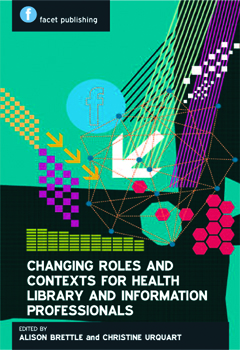
Primary tabs
You don't need to be an ALA Member to purchase from the ALA Store, but you'll be asked to create an online account/profile during the checkout to proceed. This Web Account is for both Members and non-Members.
If you are Tax-Exempt, please verify that your account is currently set up as exempt before placing your order, as our new fulfillment center will need current documentation. Learn how to verify here.
- Description
- Table of Contents
- About the authors
- Reviews
Developments in the health sector have meant new challenges and prospects for health librarians. Here, leading experts look at the changing role of health professionals and the new opportunities available to them. They explore the ways in which information professionals can remained relevant and valued in the health care community. Key topics include:
• Providing information
• Facilitating access to information
• Building capacity
• Undertaking research and evaluation
• Supporting research and practice
• Using technology
• Evidence-based practice
This is a one-stop resource for health care information professionals seeking to stay current with essential changes in the field.
Overview – Alison Brettle and Christine Urquhart PART 1: CONTEXT 1. The changing context of health for library and information professionals
- The health context – Christine Urquhart
- Health library and information professionals in Europe – Suzanne Bakker
2. Changes in information generation and use
- Changes in information generation and use: the effects on NHS library staff roles – Jenny Turner and Louise Goswami
- Taking advantage of change: how health library and information professionals are shaping the higher education experience – Neil Ford
- Information generation and use: a primary care perspective – Sue Lacey Bryant
- Changes in information generation and use: reflections on the effects on academic and NHS information services – Christine Urquhart
3. Changing technology to meet clinicians' information needs
- Clinician's information needs – Nicholas R Hardiker
4. The influences of governance, consumers and evidence based practice
- What does information management for clinical governance involve? – Gareth Lawrence
- Consumer health information – Alison Yeoman
- Evidence based practice and what it means for health library and information professionals – Alison Brettle
- Not as easy as it seems: what health professionals can tell us about applying evidence in practice – Prudence Dalrymple
PART 2: ROLES 5. Skills, competencies an knowledge - Christine Urquhart 6. The librarian as information provider and educator
- Higher education overview – Pat Spoor
- NHS overview – Debra Thornton
7. The librarian who analyses information and manages knowledge – Christine Urquhart 8. The librarian within research and evidence based practice – Alison Brettle 9. The librarian as decision maker – Jackie Cheeseborough Conclusion – Christine Urquhart and Alison Brettle
Christine Urquhart
Christine Urquhart was a full-time member of staff in the Department of Information Studies, Aberystwyth University. Since retiring from full-time teaching she has continued to pursue her research interests.
"Recommended reading if you're wondering where we're going as a profession, the text is a valuable contribution to the professional literature."
— Consumer Connection, Medical Library Association
"However working environments change in the years to come there will always be a need to collect, organize and provide access to health information. These tasks will be performed by someone but not necessarily by librarians, so if our profession wants to avoid sliding into insignificance we will need to understand how to step into the roles that are emerging. This book essentially offers the library profession a survival guide to working in healthcare."
— Library and Information Research
"By focusing on the person (health library and information professionals) rather than the place (the library, whether it is physical or digital), and the opportunities for new and developing roles generated by the contextual drivers for change that are common in all health environments, the editors have achieved a valuable outcome – a book that is optimistic about the future, and provides some ideas about how to get there if health library and information professionals are willing to take up the challenge."
— Library Management


